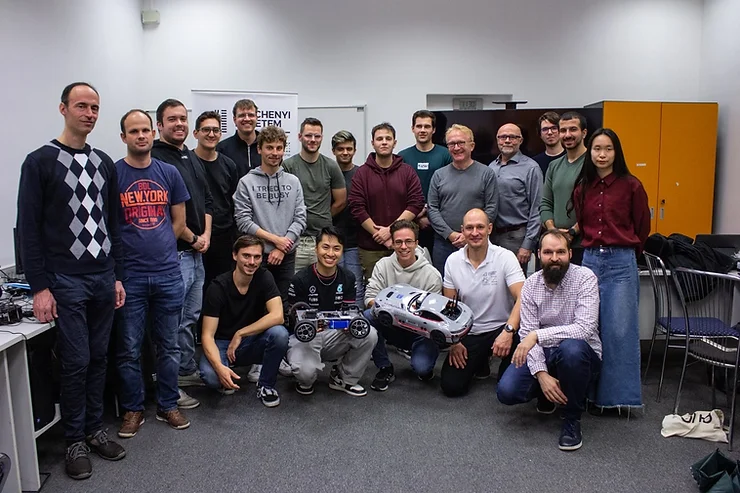SZE develops self-driving vehicles together with Bavarian universities
Széchenyi István University is taking part in an international project created by Bavarian-Hungarian intergovernmental cooperation, where students and staff of the institution are working on the development of self-driving vehicles in partnership with four Bavarian universities. As part of the programme, the German colleagues visited the University of Győr, where they took part in a multi-day workshop.
Széchenyi University is participating in a project started in the framework of the Hungarian-Bavarian Intergovernmental Committee, which aims to establish interdisciplinary student programmes to promote research cooperation. In this context, the development of self-driving vehicles has been identified as a priority for both parties. Four universities in Bavaria (Munich, Regensburg, Landsberg am Lech and Coburg) and Széchenyi István University in Hungary have joined the project. The programme recently included a workshop at the Győr institution.
"The secret of our fruitful collaboration is that the knowledge and experience of our students and teachers complement each other perfectly, and we plan to continue working together. We have found an excellent partner in Széchenyi István University, which has an outstanding automotive research infrastructure. One example is ZalaZONE, which provides a unique location for testing and development," underlined Nikolas Djukic, Head of the Bavarian Academic Centre for Central, Eastern and South-Eastern Europe (BAYHOST) at the University of Regensburg.
 Group photo of the organisers and the Hungarian and German participants of the programme (Photo: Márton Horváth)
Group photo of the organisers and the Hungarian and German participants of the programme (Photo: Márton Horváth)
The international cooperation on self-driving vehicles focuses on the legal aspects in addition to the technical aspects, so two law students are also involved in the joint work. The project provides an excellent opportunity to build international contacts and exchange knowledge. "Our aim is to continue this in the future with more partner universities in Hungary and Central and Eastern Europe. As part of this, we are also planning to have our students participate in prestigious international competitions in cooperation, thus strengthening the collaboration." emphasized Dr. Barna Hanula, Associate Professor at the Audi Hungaria Faculty of Automotive Engineering at Széchenyi István University.
The Vehicle Industry Research Centre (JKK) of Széchenyi University also plays an important role in mentoring the programme in Hungary, and its staff participated in the organisation of the workshop. "JKK places great importance on nurturing young talent from secondary school to doctoral school, where they can participate in developments that address real industrial needs. The international leg of this is the current workshop, which is the first large-scale German cooperation in the field of autonomous, i.e. self-driving vehicles. It is a great pleasure to work with our Bavarian colleagues and an honour to add new partners to our existing collaborations in Texas and Italy," said Dr. Dániel Pup, JKK's technical coordinator.
"I think it's a great opportunity to participate in this project, because as well as expanding my knowledge of self-driving vehicles, I can meet new people. And I particularly enjoy doing it in such a modern university environment," said one of the Bavarian participants, Daniel Wanner, a vehicle engineering student from Munich.
 Nikolas Djukic, Head of the Bavarian Academic Centre for Central, Eastern and South-Eastern Europe (BAYHOST) and Prof. Dr. Markus Krug, Professor at the University of Applied Sciences, Munich, visited Széchenyi University as part of the project. (Photo: Márton Horváth)
Nikolas Djukic, Head of the Bavarian Academic Centre for Central, Eastern and South-Eastern Europe (BAYHOST) and Prof. Dr. Markus Krug, Professor at the University of Applied Sciences, Munich, visited Széchenyi University as part of the project. (Photo: Márton Horváth)
"We consider it very important that the young people, while facing exciting professional challenges, also get to know new teaching styles and meet students from other nations," emphasised Prof. Dr. Markus Krug, Professor at the University of Applied Sciences Munich (Hochschule München), mentor and coordinator of the German students. The renowned expert in software development for self-driving vehicles added that both German and Hungarian students are so enthusiastic about the collaboration that the project, originally planned for only one year, will continue next year.

At the end of the workshop, the participants had the opportunity to test the self-driving vehicles they had developed in real life (Photo: Márton Horváth)











